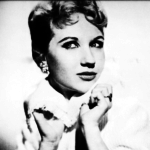
About
Born: 20 July 1935
Jo Ann Campbell started out in show business at a young age with designs on being a dancer. When Campbell reached high school, her parents decided to move their talented teenager from Jacksonville, Florida, to New York City. There, she continued to train and work as a dancer while simultaneously becoming fascinated with Alan Freed’s programming and the emergent genre of rock and roll. “If I wasn’t out dancing somewhere, I was in my bedroom with the door shut, listening to Alan Freed,” she told writer Bruce Pollock. “When he had a stage show at the Brooklyn Paramount, I went and stood in line with a couple of my friends and we got in.” At the show, Campbell saw Lillian Briggs perform and remembers being convinced that she, too, could someday be in an Alan Freed production.
Campbell—who had begun to realize that at five feet tall, success in auditioning for chorus jobs on Broadway wasn’t likely for her—turned her efforts toward singing. In 1956, she debuted at the Apollo. By 1957, she indeed became a part of Freed’s regular stable of performers. After cutting a few records for various labels without much sales success, Gone Records signed her to a contract after Freed boosted her visibility. Stylistically, her records run the gamut of styles popular with teens, from R&B-influenced rockers like “Wassa Matter With You Baby” to the country song “I’m the Girl from Wolverton Mountain” to teen idol love songs like “I Ain’t Got No Steady Date.” Campbell was also a songwriter and occasionally recorded her own material.
In the late 1950s and early 1960s, Campbell became part of the teen idol set. She landed at ABC-Paramount Records in 1960. Teen magazines and gossip rags focused on the fact that Campbell dated Bobby Darrin for a time; reporters wrote extensively about their relationship and its end in 1960, sometimes in almost purely fictional terms. Campbell also starred in two music-oriented teen films: the first was Freed’s Go, Johnny, Go! (1959), and the second, Hey, Let’s Twist! (1961) was one of several hastily made cinematic productions intended to capitalize on the Twist fad. Campbell cracked the Hot 100 a few times with records in the early sixties and continued to record and perform consistently. She garnered television appearances on shows like the Dick Clark Show, and she traveled extensively and worked the club circuit.
Campbell married musician Troy Seals in 1964, and they recorded together for a short time as “Jo Ann and Troy” on Atlantic Records. While Campbell decided to largely retire from the music business shortly thereafter, her impact on rock and roll was lasting. Just as Jo Ann found inspiration in seeing Lillian Briggs rock and roll, younger musicians in turn saw and identified with her. Buffy Sainte-Marie recalled to biographer Andrea Warner that she was impressed with Campbell: “All of the sudden here comes this woman who liked like every little girl wanted to look, you know—it was just a real surprise and a revelation. I’d be sitting in the audience, and to see someone wearing those clothes, someone I could identify with as a musician, and I’d never even heard of her? It affected me a lot in a lot of ways.”
“I’m Coming Home Late Tonight” / “Wherever You Go” Point 4 (1956).
“Come On Baby” / “Forever Young.” Eldorado 504 (1957).
“Funny Thing” / “I Can’t Give You Anything But Love.” Eldorado 509 (1957).
“Wait a Minute” / “I’m in Love With You.” Gone 5014 (1957).
“You’re Driving Me Mad” / “Rock and Roll Love.” Gone 5021 (1958).
“Wassa Matter With You” / “You-Oo.” Gone 5027 (1958).
“I’m Nobody’s Baby” / “I Really Really Love You.” Gone 5037 (1958).
“Tall Boy” / “Happy New Year, Baby.” Gone 5049 (1958).
“Nervous” / “Mama, Can I Go Out Tonite.” Gone 5055 (1959).
“I Ain’t Got No Steady Date” / “Beach Comber.” Gone 5068 (1959).
“Reviews,” Variety, 5 December 1956, 73.
“The Bad Boy and the Good Girl: The Love Story of Bobby Darin and Jo-Ann Campbell,” Modern Screen, April 1960, 22.
“Music: Artist-Disk Deals,” Variety, 11 May 1960, 47.
Gene, “Film Reviews: Hey, Let’s Twist,” Variety, 20 December 1961, 4.
“Jo-Ann Campbell, Troy Seals Merge,” Billboard, 25 Jul 1964, 17.
Bruce Pollock, When Rock Was Young: A Nostalgic Review of the Top 40 Era (New York: Holt, Reinhart, and Winston, 1981), 93–104.
Mary A. Bufwack, Mary A. and Robert K. Oermann, Finding Her Voice: Women in Country Music, 1800–2000, 2nd ed. (Nashville, TN: The Country Music Foundation Press and Vanderbilt University Press, 2003).
Andrea Warner, Buffy Sainte-Marie: The Authorized Biography (Vancouver: Greystone Books, 2018), 40–41.
